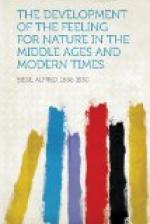Sonnet 60:
Like as the waves make toward the pebbled
shore,
So do our minutes hasten to their end;
Each changing place with that which goes
before,
In sequent toil all forwards do contend.
Sonnet 73:
That time of life thou mayst in me behold,
When yellow leaves, or none, or few do
hang
Upon those boughs which shake against
the cold,
Bare ruin’d choirs, where late the
sweet birds sang
In me thou see’st the twilight of
such day
As after sunset fadeth in the west,
Which by-and-by black night doth take
away,
Death’s second self, that seals
up all in rest.
In me thou see’st the glowing of
such fire
That on the ashes of his youth doth lie
As the death-bed whereon it must expire,
Consumed with that which it was nourished
by.
This thou perceivest, which makes thy
love more strong
To love that well which thou must leave
ere long.
There are no better similes for the oncoming of age and death, than the sere leaf trembling in the wind, the twilight of the setting sun, the expiring flame.
Almost all the comparisons from Nature in his plays are original, and rather keen and lightning-like than elaborate, often with the terseness of proverbs;
The strawberry grows underneath the
nettle.
(Henry V.)
Smooth runs the water where the brook
is deep.
(Henry VI.)
The waters swell before a boisterous
storm.
(Richard III.)
Sometimes they are heaped up, like Calderon’s, ‘making it’ (true love)
Swift as a shadow, short as any dream,
Brief as the lightning in the collied night
That in a spleen unfolds both heaven and earth,
And ere a man hath power to say ‘Behold!’
The jaws of darkness do devour it up.
(Midsummer Night’s Dream.)
Compared with Homer’s they are very bold, and shew an astonishing play of imagination; in place of the naive simplicity and naturalness of antiquity, this modern genius gives us a dazzling display of wit and thought. To quote only short examples[3]:
‘Open as day,’ ‘deaf
as the sea,’ ‘poor as winter,’
‘chaste as unsunn’d snow.’
He ranges all Nature. These are characteristic examples:
King Richard doth himself appear
As doth the blushing discontented sun
From out the fiery portal of the east,
When he perceives the envious clouds are
bent
To dim his glory and to stain the track
Of his bright passage to the occident.
(Richard
II.)
Since the more fair crystal is the sky,
The uglier seem the clouds that in it
fly.
As when the golden sun salutes the morn,
And, having gilt the ocean with his beams,
Gallops the zodiac in his glistering coach
And overlooks the highest peering hills,
So Tamora. (Titus
Andronicus.)




